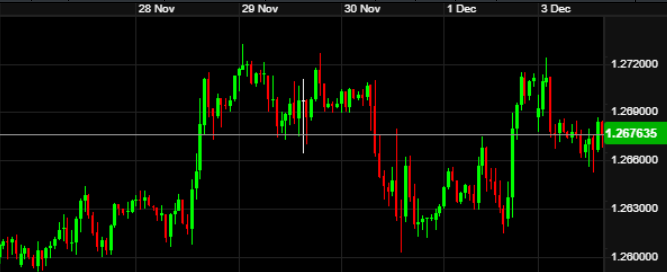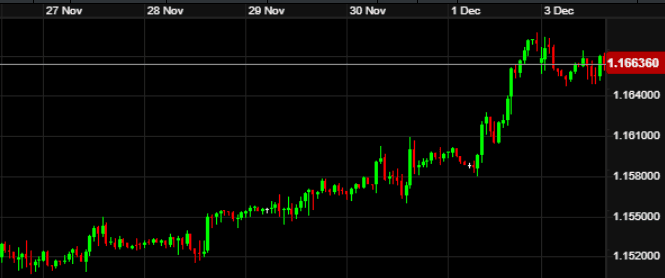ACM Update 04-12-23

A strong end to November for sterling as we saw seven straight days of gains vs the Euro for the first time since February, as well as its strongest month of the year so far versus the Dollar. This was all despite a mixed (at best) set of data releases for GBP.
In the US and Europe, inflation-related releases were the main market movers. The Federal Reserve seem to be content with their current monetary policy, whilst Eurozone inflation is down to just 0.4% above the ECB’s target. Markets are now pricing in the chance of a rate cut as soon as March from Frankfurt.
Starting in the UK, the Bank of England Governor, Andrew Bailey, spoke last week about his ongoing growth concerns for the economy, stating the outlook was currently “the worst in his lifetime”. Some commentators suggested this felt like a response to Jeremy Hunt’s Autumn statement, where the Government had claimed all the credit for slashing inflation and predicting economic growth for the UK.
It seemed like the OECD were in agreement with Andrew Bailey though, as they too reduced their projection for UK growth in 2024 down to 0.7%. This leaves Britain behind its fellow G7 peers. It also added that markets are wrong to expect borrowing costs to fall in the UK and Eurozone any time soon, forecasting them to remain high until 2025.
Elsewhere, Bank of England Deputy Governor, Dave Ramsden, used his own speech to warn about an uncertain economic outlook, making future monetary policy difficult to call. Overall, GBP enjoyed a buoyant week against other major currencies, driven by the potential of rates remaining higher for longer, as well as weaker data elsewhere.
GBP saw its highest against the Dollar in three months last week. Movements for the full week can be seen in the chart below:

In the US, we saw some sizeable rate moves driven by data and events. Tuesday afternoon was full of speeches from Federal Reserve committee members, with two members who had previously been pushing for higher rates, implying they now feel comfortable in holding steady for now.
This led to markets becoming even more confident of a further hold/pause next week, as well as no further rate hikes to come from the Fed. As a result, next week’s rate announcement itself looks confidently like a hold for now. Comments in the press conference from Jerome Powell will be the main mover, if he talks about ongoing policy.
US GDP for Q3 meanwhile was revised up further from 4.9% to 5.2%. The Federal Reserve’s Beige Book (pre-meeting data release) did suggest though this had slowed in recent weeks since those numbers. The Fed’s chosen inflation metric of Core PCE data, also showed inflation continuing to cool in line with expectation.
Jerome Powell’s speech late on Friday afternoon reversed the Dollar’s midweek recovery, with him admitting that monetary policy is currently holding the economy back. His wording moved him into a more dovish tone, increasing bets for Fed rate cuts to come. These still seem a few meetings away yet though.
In Europe, the CPI Flash Estimate was the biggest mover of the week, as inflation for November came in at 2.4%, with 2.7% the forecast and down from 2.9% the month before. This combined with falls in inflation from various Eurozone countries saw the single currency fall back on Thursday morning.
With inflation now sitting just 0.4% above the ECB’s benchmark, markets are already pricing a 50:50 chance of the ECB cutting rates in March. However, two speeches from ECB President Christine Lagarde last week suggested nothing of the sort. Watch this space again for next week’s meeting.
The positive movements for GBP against the Euro last week can be seen in the chart below:

Elsewhere, Australian inflation fell back from 5.6% to 4.9% in October’s data. A large portion of this was due to fuel price drops feeding through. Retail sales from Australia showed a month on month contraction of -0.2% however. Despite this, new RBA Governor, Michele Bullock, says economic activity is currently stronger than the bank had expected.
Over the other side of the Tasman, the Reserve Bank of New Zealand held interest rates at 5.50% for the fourth meeting in a row. They did however warn that they may not necessarily be finished with rate hikes yet.
The week ahead:
Monday – Swiss CPI Inflation (07:30 UK time), MPC Dhingra speech (11:30), ECB Lagarde speech (14:00)
Tuesday – RBA rate announcement (03:30), EU/UK/US Services PMI data (08:15-15:00), JOLTS Jobs data (15:00)
Wednesday – BoE Bailey speech (11:00), ADP Non-Farm data (13:15), Bank of Canada rate announcement (15:00)
Thursday – Eurogroup Meetings, US Unemployment Claims (13:30)
Friday – German Final CPI (07:00), US Non-Farm Payrolls (13:30)
Into December and we are still a few weeks away from markets slowing down for the Christmas period. GBP remains buoyant and we saw almost three-month highs against both the Euro and US Dollar last week. This is all really based on the Bank of England’s “Table Mountain” approach of interest rates needing to remain higher for longer.
Meanwhile, the Eurozone and US economies seem to be moving more towards cuts. The latest inflation print from the ECB puts inflation back close to target now, and with various countries struggling with growth, we may see policy moving back towards cutting rates in a few months. Quite when though will largely be data dependent.
In the US, if there is a recession coming then it seems pretty well hidden at the minute. Growth is flying relative to other economies and inflation seems to be coming back under control. Powell’s Friday comments could be interpreted as the Fed reaching their pivot point soon and looking at revising policy accordingly. This Friday's Non-Farm payrolls for November will be as significant as ever.
Both of the above should present favourable conditions for GBP sellers in the short term, with opportunities likely versus the Euro and Dollar. The next interest rate announcements from the “big three” all come within the next ten days:
Federal Reserve – Wednesday 13th December @ 19:00 UK time
Bank of England – Thursday 14th December @ 12:00 UK time
European Central Bank – Thursday 14th December @ 13:15 UK time
Watch this space.
Have a great week ahead.